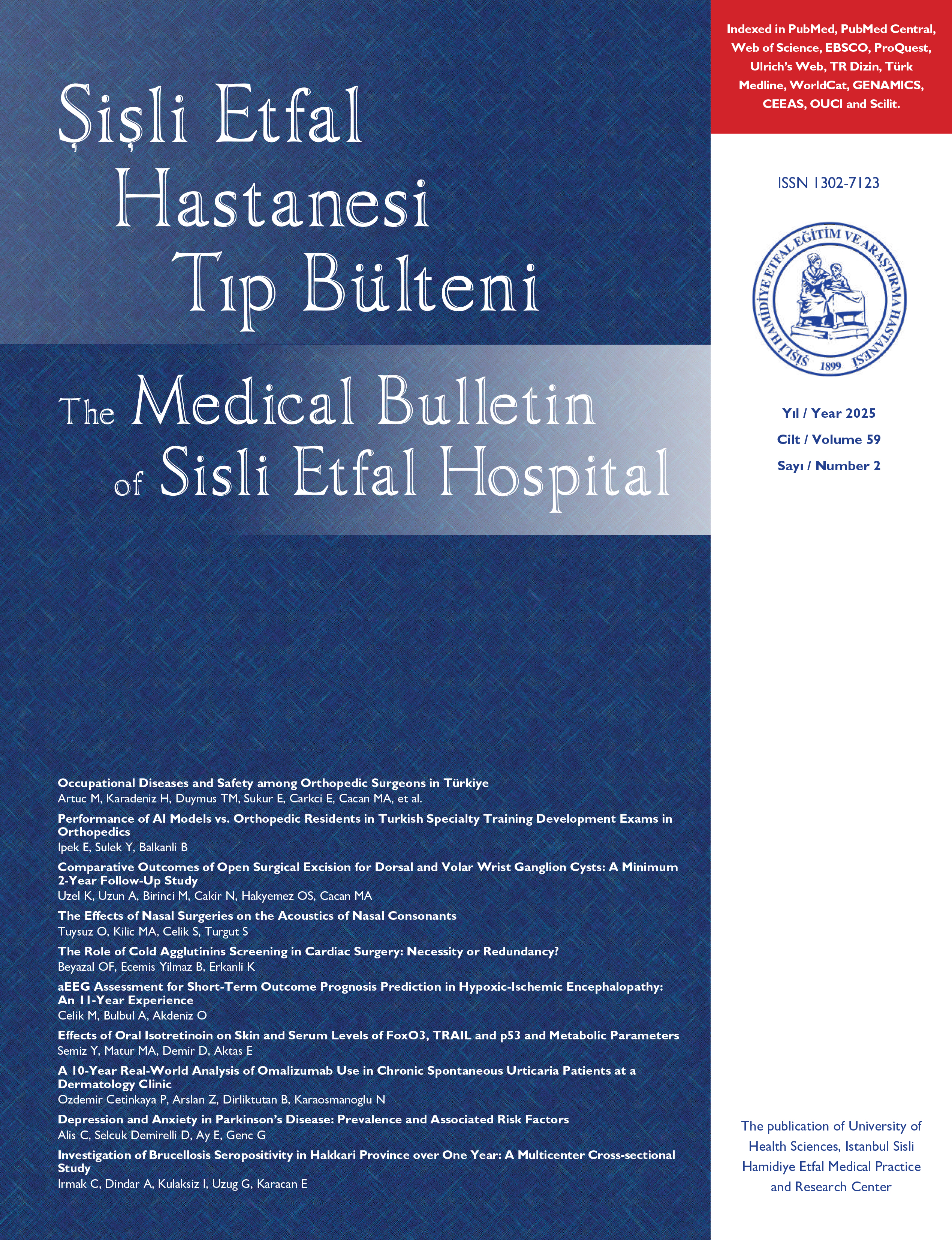
Transkateter Aort Kapak İmplantasyonu Sonrası Majör Advers Kardiyak Olayların Tahmini: GRACE Skoru ile Yapılan Makine Öğrenimi Yaklaşımı
Aslan Erdogan1, Omer Genc1, Duygu Inan1, Abdullah Yildirim2, Ersin Ibisoglu1, Yeliz Guler1, Duygu Genc1, Ahmet Guler1, Ali Karagoz3, Ibrahim Halil Kurt2, Cevat Kirma31Başakşehir Cam ve Sakura Şehir Hastanesi, Kardiyoloji Kliniği, İstanbul2Türkiye Sağlık Bilimleri Üniversitesi, Adana Şehir Eğitim ve Araştırma Hastanesi, Kardiyoloji Kliniği, Adana
3Kartal Koşuyolu Yüksek İhtisas Eğitim ve Araştırma Hastanesi, Kardiyoloji Kliniği, İstanbul
Amaç: Öngörücü risk skorları, ciddi aort stenozu (AS) olan hastalarda hastane seçiminde ve müdahale sonrası komplikasyon olasılığını değerlendirmede önemli bir etkiye sahiptir. Bu çalışma, Global Registry of Acute Coronary Events (GRACE) skoru dahil olmak üzere öngörücü parametreleri analiz ederek, makine öğrenimi (ML) tekniklerinin 30 günlük major advers kardiyak olayları (MACE) tahmin etme konusundaki kullanılabilirliğini keşfetmeyi amaçlamaktadır.
Metod: Bu retrospektif, çok merkezli, gözlemsel çalışma, Nisan 2020 ile Ocak 2023 tarihleri arasında transkateter aort kapak implantasyonu (TAVI) uygulanan ciddi AS tanısı almış 453 ardışık hastayı içermektedir. Birincil sonuç, prosedür sonrası 1 aylık takip döneminde meydana gelen MACE'yi içeren bir bileşim olarak tanımlandı. Geleneksel binomiyal lojistik regresyon ve ML modelleri tahmin amaçlı kullanıldı ve karşılaştırıldı.
Bulgular: Çalışma popülasyonunun ortalama yaşı 76.1'dir ve %40.8'i erkektir. Birincil sonuç, vakaların %7.5'inde gözlendi. Birincil sonuç bileşenlerinden, tüm nedenlere bağlı ölüm, prosedür sonrası miyokard enfarktüsü (MI), serebrovasküler olaylar (CVE) oranları sırasıyla %4.2, %2.4 ve %1.9 olarak rapor edildi. GRACE skoru ile birlikte kullanılan ML tabanlı Extreme Gradient Boosting (XGBoost) modeli, birincil sonucu tahmin etmede, GRACE skoru olmadan ML modeli ve geleneksel regresyon modeline kıyasla üstün ayırt edici performans gösterdi [Eğri Altındaki Alan (AUC)= 0.98 (0.91-0.99), AUC= 0.87 (0.80-0.98), AUC= 0.84 (0.79-0.96)].
Sonuç: ML teknikleri, özellikle GRACE skoru gibi kanıtlanmış klinik parametrelerle birlikte kullanıldığında, klinik uygulamalardaki sonuçları öngörmede önemli bir potansiyele sahiptir. (SETB-2024-01-028)
Anahtar Kelimeler: Karar ağacı, GRACE skoru, MACE, TAVI, XGBoost, VARC-3
Prediction of Major Adverse Cardiac Events After Transcatheter Aortic Valve Implantation: A Machine Learning Approach with GRACE Score
Aslan Erdogan1, Omer Genc1, Duygu Inan1, Abdullah Yildirim2, Ersin Ibisoglu1, Yeliz Guler1, Duygu Genc1, Ahmet Guler1, Ali Karagoz3, Ibrahim Halil Kurt2, Cevat Kirma31Department of Cardiology, Basaksehir Cam and Sakura City Hospital, Istanbul, Türkiye2Department of Cardiology, University of Health Sciences Türkiye, Adana City Training and Research Hospital, Adana, Türkiye
3Department of Cardiology, Kartal Kosuyolu High Specialization Training and Research Hospital, Istanbul, Türkiye
Objectives: Predictive risk scores have a significant impact on patient selection and assessing the likelihood of complications following interventions in patients with severe aortic stenosis (AS). This study aims to explore the utility of machine learning (ML) techniques in predicting 30-day major adverse cardiac events (MACE) by analyzing parameters, including the Global Registry of Acute Coronary Events (GRACE) score.
Methods: This retrospective, multi-center, observational study enrolled 453 consecutive patients diagnosed with severe AS who underwent transcatheter aortic valve implantation (TAVI) from April 2020 to January 2023. The primary outcome was defined as a composition of MACE comprising periprocedural myocardial infarction (MI), cerebrovascular events (CVE), and all-cause mortality during the 1-month follow-up period after the procedure. Conventional binomial logistic regression and ML models were utilized and compared for prediction purposes.
Results: The study population had a mean age of 76.1, with 40.8% being male. The primary endpoint was observed in 7.5% of cases. Among the individual components of the primary endpoint, the rates of all-cause mortality, MI, and CVE were reported as 4.2%, 2.4%, and 1.9%, respectively. The ML-based Extreme Gradient Boosting (XGBoost) model with the GRACE score demonstrated superior discriminative performance in predicting the primary endpoint, compared to both the ML model without the GRACE score and the conventional regression model [Area Under the Curve (AUC)= 0.98 (0.91-0.99), AUC= 0,87 (0.80-0.98), AUC= 0.84 (0.79-0.96)]. Conclusion: ML techniques hold the potential to enhance outcomes in clinical practice, especially when utilized alongside established clinical tools such as the GRACE score.
Keywords: Decision tree, GRACE score, MACE, TAVI, XGBoost, VARC-3
Makale Dili: İngilizce



















